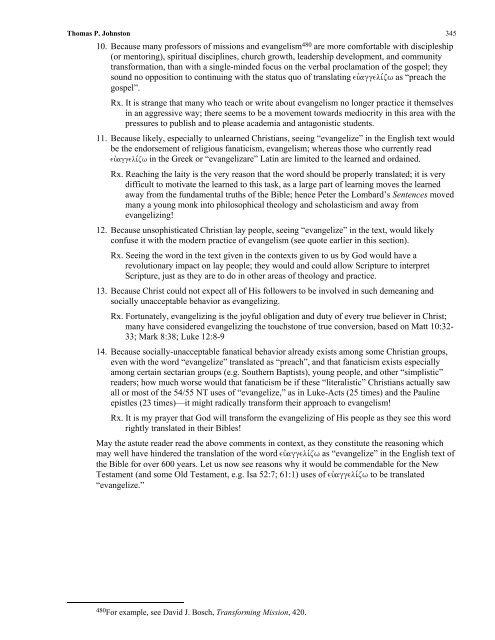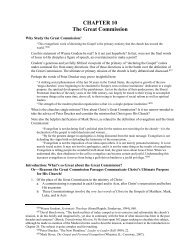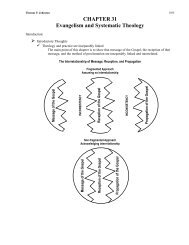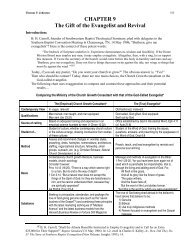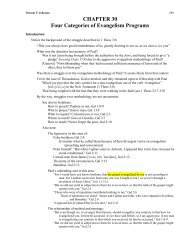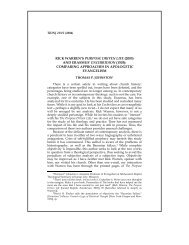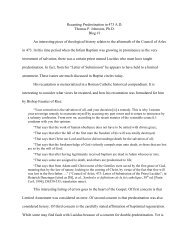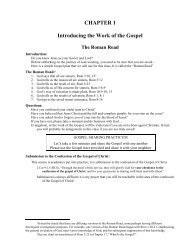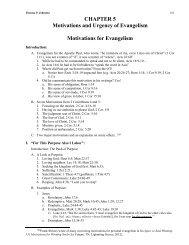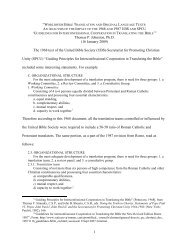CHAPTER 7 Defining Evangelizing - Evangelism Unlimited
CHAPTER 7 Defining Evangelizing - Evangelism Unlimited
CHAPTER 7 Defining Evangelizing - Evangelism Unlimited
Create successful ePaper yourself
Turn your PDF publications into a flip-book with our unique Google optimized e-Paper software.
Thomas P. Johnston 345<br />
10. Because many professors of missions and evangelism480 are more comfortable with discipleship<br />
(or mentoring), spiritual disciplines, church growth, leadership development, and community<br />
transformation, than with a single-minded focus on the verbal proclamation of the gospel; they<br />
sound no opposition to continuing with the status quo of translating euvaggeli,zw as “preach the<br />
gospel”.<br />
Rx. It is strange that many who teach or write about evangelism no longer practice it themselves<br />
in an aggressive way; there seems to be a movement towards mediocrity in this area with the<br />
pressures to publish and to please academia and antagonistic students.<br />
11. Because likely, especially to unlearned Christians, seeing “evangelize” in the English text would<br />
be the endorsement of religious fanaticism, evangelism; whereas those who currently read<br />
euvaggeli,zw in the Greek or “evangelizare” Latin are limited to the learned and ordained.<br />
Rx. Reaching the laity is the very reason that the word should be properly translated; it is very<br />
difficult to motivate the learned to this task, as a large part of learning moves the learned<br />
away from the fundamental truths of the Bible; hence Peter the Lombard’s Sentences moved<br />
many a young monk into philosophical theology and scholasticism and away from<br />
evangelizing!<br />
12. Because unsophisticated Christian lay people, seeing “evangelize” in the text, would likely<br />
confuse it with the modern practice of evangelism (see quote earlier in this section).<br />
Rx. Seeing the word in the text given in the contexts given to us by God would have a<br />
revolutionary impact on lay people; they would and could allow Scripture to interpret<br />
Scripture, just as they are to do in other areas of theology and practice.<br />
13. Because Christ could not expect all of His followers to be involved in such demeaning and<br />
socially unacceptable behavior as evangelizing.<br />
Rx. Fortunately, evangelizing is the joyful obligation and duty of every true believer in Christ;<br />
many have considered evangelizing the touchstone of true conversion, based on Matt 10:32-<br />
33; Mark 8:38; Luke 12:8-9<br />
14. Because socially-unacceptable fanatical behavior already exists among some Christian groups,<br />
even with the word “evangelize” translated as “preach”, and that fanaticism exists especially<br />
among certain sectarian groups (e.g. Southern Baptists), young people, and other “simplistic”<br />
readers; how much worse would that fanaticism be if these “literalistic” Christians actually saw<br />
all or most of the 54/55 NT uses of “evangelize,” as in Luke-Acts (25 times) and the Pauline<br />
epistles (23 times)—it might radically transform their approach to evangelism!<br />
Rx. It is my prayer that God will transform the evangelizing of His people as they see this word<br />
rightly translated in their Bibles!<br />
May the astute reader read the above comments in context, as they constitute the reasoning which<br />
may well have hindered the translation of the word euvaggeli,zw as “evangelize” in the English text of<br />
the Bible for over 600 years. Let us now see reasons why it would be commendable for the New<br />
Testament (and some Old Testament, e.g. Isa 52:7; 61:1) uses of euvaggeli,zw to be translated<br />
“evangelize.”<br />
480 For example, see David J. Bosch, Transforming Mission, 420.


